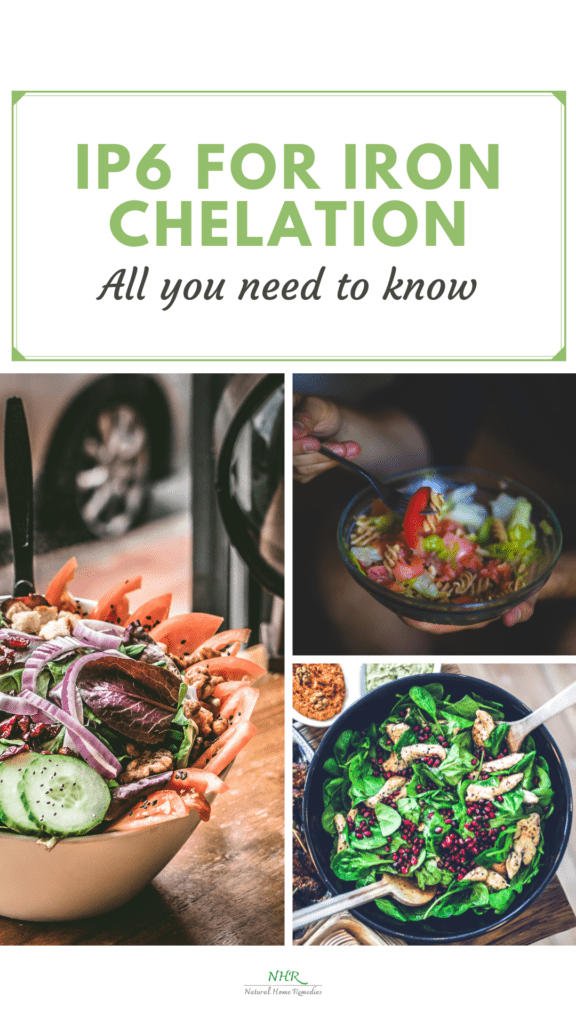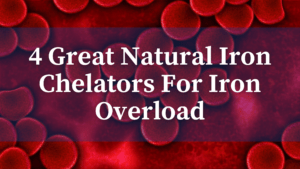 If you are looking for natural ways to lower your iron levels, you should explore IP6 (also known as Phytic Acid) for its iron chelation, antioxidant, and immune-boosting activity.
If you are looking for natural ways to lower your iron levels, you should explore IP6 (also known as Phytic Acid) for its iron chelation, antioxidant, and immune-boosting activity.
I have been taking it for a couple of years and wrote this article to share my experience and recommendations related to IP6.
What is IP6?
IP6 (Inositol hexaphosphate, Phytic Acid) is a natural compound found in many plants, vegetables, and foods with high fiber content, such as cereals. We can also find it in our cells and those of all mammals, where it plays a central role in inter and intracellular signal transduction, cell proliferation, and differentiation.
Its anti-oxidant properties have long been well-known, and IP6 has recently been subjected to many studies regarding its preventative role for cancer and its part in reducing the size of tumors and existing cancerous spreads. On top of those major functions, it also helps our immune system, lowers cholesterol levels, and maintains proper kidney function.
IP6 has been recognized as a natural iron chelator, making it a great supplement for patients with Thalassemia Major.
Click here to read the article I wrote about natural iron chelators.
What are the benefits of IP6 in Iron Overload and Thalassemia Major?
IP6 lightens the color of your skin
I’ve been taking IP6 for a couple of years now, and the first noticeable change was my skin color. Iron overload can lead to bronzing of the skin and within a couple of weeks, I noticed a significant lightening in my skin color.
And not just me, my friends and family noticed it too.
I can say this for sure, IP6 definitely improves the skin color in Thalassemia Major patients within a few weeks even at a low dose.
Research has shown that IP6 lowers ferritin levels
Studies have shown that IP6 reduces iron and ferritin levels due to its high antioxidant activity. It also has the ability to hinder the absorption of iron and other heavy metals in the gastrointestinal tract.
IP6 improves immune health
IP6 is well-known for its action on the immune system. It activates natural killer cells, a sub-group of lymphocytes that constitute our first line of defense when faced with any new 0r unknown diseases in our body. This characteristic makes it a powerful immune booster.
What are the side effects of IP6?
I take 1 to 2 tablets of 500 mg IP6 every day and have not faced any side effects to date. It is generally considered safe to take but you must consult with your doctor for the right dosing to avoid any side effects.
One person I know reported constipation for a few days after starting IP6 which went away after some days. So I would recommend you monitor yourself for some time when you start taking IP6. If you feel any negative changes, stop taking it and talk to your doctor.
What are natural sources of IP6?
The best natural sources of IP6 are:
- fruits
- beans
- seeds
- grains
- nuts
However, natural sources do not contain enough to provide the added health benefits that you can get from a high-quality supplement.
What’s the best time to take IP6?
For Thalassemia Major patients, it is better to take IP6 on an empty stomach or before a meal. But keep in mind that IP6 is considered an antinutrient and studies have shown that it chelates zinc, copper, and calcium along with iron.
This means you will need to supplement zinc, copper, and calcium in order to ensure you are getting the right amount and avoid deficiencies.
Which is the best IP6 Supplement for Iron Chelation?
I have tried some IP6 supplements but the best one has been Nature’s Way Cell Forté IP-6 & Inositol (affiliate link). This has worked the best for me and others I know.
My second option is Jarrow Formulas IP6 (affiliate link). This is a great product but it’s always been my fallback option as I feel it isn’t as potent as Cell Forte.
So my recommendation is Nature’s Way Cell Forté IP-6 & Inositol (affiliate link) and it is my default IP6 supplement. Has been for the past few years now.
Here are all the supplements and vitamins I’ve been using. Don’t forget to check them out.
FAQs
Does IP6 lower ferritin levels and chelate iron?
Yes, IP6 does lower ferritin and iron levels. Studies have shown that oral dosage of IP6 of up to 200mg/kg resulted in a reduction of serum ferritin and iron levels.
Is IP6 the same as inositol?
No, IP6 is not the same as inositol. They are two separate compounds but their combination is effective at chelating iron and supporting cancer treatment.
Should IP6 be taken on an empty stomach?
Yes, IP6 should preferably be taken on an empty stomach (unless advised otherwise by your doctor).
Does IP6 chelate calcium and zinc?
Yes, IP6 is an antinutrient, and studies that it chelates zinc, copper, and calcium along with iron. Hence it is important that you take IP6 and these minerals at separate times and not together.
What is the right IP6 dosage for iron chelation?
IP6 dosage for iron chelation will depend on your weight. However, I recommend you start with 500 to 1000 mg and increase the dose slowly. Keep in mind, this is not going to be your primary chelator. So you don’t need to take high doses.
Is it safe to take IP6?
Studies have shown that IP6 is safe to take at a dose of 12 grams for up to 3 months. However, there have not been any long-term studies hence I feel it is better to take it intermittently – that’s what I do. Please consult your doctor before starting IP6 as natural supplements affect everyone differently.
What is the difference between IP6 and Phytic Acid?
IP6 and Phytic Acid are the same thing and the names can mostly be used alternatively.
References:
https://pubmed.ncbi.nlm.nih.gov/28068635/




